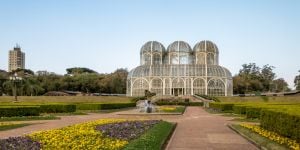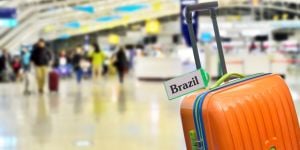Police Killings in Bahia and Precautions to Avoid Becoming a Victim
Background: https://www.theguardian.com/world/artic … lings-rate
In the US, I support the police financially because they provide security to the general public. However I do not condone senseless violence based on racial (or other criteria) profiling. There are a few bad apples in the law enforcement system and this is giving the whole system a bad wrap. By and large, the police force is doing the best that it can.
How is law enforcement in Brazil? Are there some precautions to take so that you do not get targeted by accident?
This is a difficult subject to approach and what I am hoping to get feedback on things NOT to do so that you don't become an unintended victim - nothing more than just that....
@Pablo888
The sad and alarming reality is that if you're Black and live In a favela (particularly in Bahia, the focus of the article you reference), your chances of being killed by the police are exponentially higher than if you are white and not in a favela. The odds are even higher if you're a young Black male In a favela. That's the racism of police violence in a state where police kill with impunity . A white middle class person can go for years without having much interraction with cops, aside from the odd traffic stop.
I'm going to disagree. What % of Caucasians live in Bahia ?
There are plenty of black and mulatto PM members in the batalao beside my condo in Copa......in fact I'd roughly estimate well over 50%.
Cops are like bees. Don't aggravate them and they don't bite you.
I've got no issues with BOPE or the PM I've had encounters with. Be polite and show respect, a concept that works everywhere with every situation IMHO.
FWIW the Guardian is a globalist propaganda rag from a country conducting the greatest crackdown on free speech in the western world. These scum (globalists) are crapping on every BRIC's country because they are collapsing and we are rising. Like Elon Musk so gracefully told the EU the other day.........
Cops are like bees. Don't aggravate them and they don't bite you.
I've got no issues with BOPE or the PM I've had encounters with. Be polite and show respect, a concept that works everywhere with every situation IMHO.
-@Gasparzinho 777
In the US, I have drilled this into my head when dealing with law enforcement in general:
- Be respectful - police deal with all kinds of people and from all walks of life - being respectful is the best way to show appreciation for what they do. "Officer, Sir, etc..." What is the proper way to address in Brazil?
- When in doubt, do not run away - that's extremely suspicious behavior...
- Stay still or move really slowly and communicate while doing so...
- Hands away from the body - and open palms very visible...
- Don't try to get your phone to record the event... I don't understand the fixation about trying to grab a cell phone.
- Follow / obey instructions provided. If you don't understand the instructions, stay still and ask to repeat....
In general, law enforcement officers are people who want to go back home to their families just like you.
I have lived in Bahia for 15 years. I have had no unpleasant encounters with police here.
I'm going to disagree. What % of Caucasians live in Bahia ?
There are plenty of black and mulatto PM members in the batalao beside my condo in Copa......in fact I'd roughly estimate well over 50%.
Cops are like bees. Don't aggravate them and they don't bite you.
I've got no issues with BOPE or the PM I've had encounters with. Be polite and show respect, a concept that works everywhere with every situation IMHO.
FWIW the Guardian is a globalist propaganda rag from a country conducting the greatest crackdown on free speech in the western world. These scum (globalists) are crapping on every BRIC's country because they are collapsing and we are rising. Like Elon Musk so gracefully told the EU the other day.........
-@Gasparzinho 777
Roughly 85% of the population of Salvador (where I live) is not white, and I assume the numbers are similar for the state of Bahia. However, the small slice of whites represent most of the power brokers, the politicians and the wealthy. Police don't kill them because they know there will be consequences. In that power dynamic the race of the police doing the killing is inconsequential. Btw, the police in Bahia are now the most murderous in Brasil, both in absolute numbers and per capita. One in four Brazilian police killings happens in Bahia, which has slightly fewer than 15 million of Brasil's 212 million residents. You can think what you about the Guardian, but Brazilian newspapers express the same alarm about the level of police killings in Bahia.
And most Brasilian news media, especially Rede Globo, is slanted exactly like the Guardian.
If the % of colors were reversed, what would we be saying ? It's all stats and how they flow.
08/15/24 @Pablo888. I'm staying well away from all the ethnographic/sociological "analysis". Just keep in mind that most Brazilians will automatically tag you as "foreign". That means that a lot of people will read you as "ripe for the picking", but just as many or more will read you as at least honorary "Upper Class", with all benefits and privileges that accrue to that status. In other words, unless you're in the proverbial wrong place at the wrong time -- e.g. you have a penchant for the deplorable "favela tours" (poor people should NOT be treated as a tourist attraction), or you frequent locales where drugs are being dealt after dark -- your chances of being caught in a crossfire, much less being a target of the police, approach zero.
If you DO have contact with the police, the principles you lay out in your Post #4 above should serve you in good stead.
And most Brasilian news media, especially Rede Globo, is slanted exactly like the Guardian.
If the % of colors were reversed, what would we be saying ? It's all stats and how they flow.
-@Gasparzinho 777
The "colours" will never be "reversed" because favelas in Brasil, where large numbers of indiscriminate police killings occur, are largely Black--everywhere in the country. That socioeconomic reality is largely the result of this country's racist past.
From Salvador's Correio newspaper, which notes police in Bahia killed 1,699 people in one year and "o risco de uma pessoa negra morrer por intervenção da polícia é 3,8 vezes maior do que o de a vítima letal ser uma pessoa branca."
Baianos são as maiores vítimas de violência policial no país; veja as cidades com mais mortes
Dos 10 municípios com mais vítimas por ação da polícia, metade são baianos
Maysa Polcri
Publicado em 19 de julho de 2024
‘Suspeito morre em confronto com a polícia’. A cada semana, diversas notícias desse tipo se acumulam em sites e redes sociais em todo Brasil. Em um estado do país, no entanto, o cenário é ainda mais grave. A Bahia lidera o ranking de mortes em decorrência de ações policiais pelo segundo ano consecutivo. Só no ano passado, 1.699 pessoas morreram por ações de agentes de segurança que estavam ou não em serviço.
As informações foram reveladas pelo Anuário Brasileiro de Segurança Pública, divulgado na quinta-feira (18). Em 2022, foram 1.467 mortes desse tipo no estado - 232 a menos do que no ano seguinte. O número de pessoas mortas pela ação das polícias Militar e Civil na Bahia vem crescendo desde 2021. Naquele ano, a Bahia ficou atrás do Rio de Janeiro, mas superou o estado do Sudeste nas últimas duas edições da pesquisa.
A disputa das organizações criminosas e a letalidade policial são as maiores causas de mortes violentas em todo o país, segundo o Anuário de Segurança Pública. Dudu Ribeiro, pesquisador da Iniciativa Negra, ressalta que o fato da polícia baiana ser a que mais causa mortes no Brasil, aumenta os índices de violência no estado. De acordo com o Anuário, o risco de uma pessoa negra morrer por intervenção da polícia é 3,8 vezes maior do que o de a vítima letal ser uma pessoa branca.
“Segundo os dados que nós monitoramos, as polícias participam de, em média, 36% dos eventos de tiroteio em Salvador e na Região Metropolitana. Um modelo de segurança pública baseado na ocupação dos territórios e na intensificação dos conflitos coloca toda a comunidade baiana na linha do tiro, mas o alvo preferencial tem sido meninos e homens jovens negros moradores dos bairros periféricos”, analisa o pesquisador.
Em junho deste ano, policiais envolvidos na morte de oito pessoas durante uma abordagem na cidade baiana de Itatim foram afastados de suas funções. A investigação do Ministério Público da Bahia aponta que as vítimas foram executadas e que a cena do crime foi, possivelmente, alterada. Inicialmente, o caso havia sido tratado como confronto entre policiais e suspeitos.
Para se ter noção da dimensão do problema, a Bahia, que é o quarto estado mais populoso do país, registrou mais mortes em ações policiais do que São Paulo, Minas Gerais e Rio de Janeiro juntos. Os estados do Sudeste, os três com mais habitantes do Brasil, registraram 504, 136 e 871 mortes, respectivamente. A pesquisa utiliza como fonte de dados boletins de ocorrências fornecidos pelas unidades da federação.
“Percebemos que há uma resposta desproporcional da polícia em relação ao enfrentamento da criminalidade. Em 2018, as polícias foram responsáveis por 8% do total de mortes violentas intencionais do Brasil. Em 2023, subiu para 13%”, pontua Renato Sérgio Lima, presidente do Fórum Brasileiro de Segurança Pública. Ele detalha, no entanto, que a tendência de aumento não acontece em todos os estados da mesma forma.
“Isso não é um padrão nacional, mas de algumas localidades, como a Bahia e o Amapá, que têm as cidades com as maiores mortes em decorrência de letalidade policial”, completa. Jequié, no centro-sul do estado, é o município com a maior proporção de vítimas fatais de violência policial no Brasil - a taxa é de 46,6 mortes a cada 100 mil habitantes.
No ano passado, a cidade liderou o ranking de mortes violentas intencionais e, nesta edição do Anuário, aparece como a cidade em que a polícia mais mata. De acordo com Renato Sérgio Lima, a violência no município está relacionada às disputas de facções criminosas e a violência policial em excesso. “Jequié é uma cidade estratégica, em termos geográficos, para escoar drogas e uma série de mercadorias que o crime organizado explora, como cigarros, minérios e combustíveis”, pondera.
Além de Jequié, aparecem no ranking das 10 cidades brasileiras com mais mortes pela polícia: Eunápolis, Simões Filho, Salvador e Luís Eduardo Magalhães. Questionada sobre o desempenho da Bahia no Anuário, a Secretaria de Segurança Pública da Bahia (SSP), afirmou que “as forças de segurança atuam com rigor, dentro da legalidade e com firmeza contra grupos criminosos envolvidos com tráficos de drogas e armas, homicídios, roubos e corrupção de menores”.
As ações da polícia também causam mortes dos agentes de segurança, mas em menor proporção. Em 2023, seis policiais militares morreram em serviço na Bahia, segundo o Anuário. Haviam sido quatro no ano anterior. Em relação à morte não natural de policiais fora do serviço, foram três. A edição mais recente da pesquisa não registrou mortes de policiais civis no estado.
Thank you all for the feedback here. It appears that the customary common-sense approach when dealing with law enforcement in Brazil is similar to anywhere in the world.
What I learnt in addition from the post is that:
- Expats will be noticed - by the accent / demeanor / appearance. Hence unless breaking the law, it is relatively easier to stay clear of the police. (Posts from @abthree and @alan279 above)
- Expats can become easy targets for the locals. They need to be extra vigilant to avoid scams and being in situations that might draw in the police. (@abthree's reply)
- Don't tempt fate by visiting places where you don't belong. @abthree is right with his example above.
- Don't provoke the police - like @gasparzinho mentioned - and they will leave you alone.
The only thing that I am missing here is:
- How do you know where not to go and what not to do so that you are not at the wrong place / wrong time?
Just to give you an example, I just spent the weekend in NYC with plans to spend most of the time in Manhattan and I booked an AirBnB in East Brooklyn - thinking that was just a subway ride away. I did not know that East Brooklyn was the worst neighborhood in NYC. I made the mistake of relying on feedback / reviews from AirBnB.
How do you know where not to go and what not to do so that you are not at the wrong place / wrong time? -@Pablo888
In the case of favelas, they're pretty obvious. They also tend to be very large. (Google an image of "favela"). Just to clarify, most of the people who live in favelas are good, decent people, but these are are also hubs for drug trafficking and other crimes, In many cases, armed drug gangs keep a close watch on who comes and goes. One of characteristics of Brasil is that a wealthy neighbourhood can be right next to a favela. In other cases, most locals are well aware of places to avoid, so ask around. Avoid speaking English when walking around areas that worry you and avoid dressing like a gringo. In popular tourist areas try not to make expensive cameras, jewelry, cell phones and other valuables obvious. Once you live here for a bit caution will become second nature.
08/16/24 The only thing that I am missing here is: How do you know where not to go and what not to do so that you are not at the wrong place / wrong time?Just to give you an example, I just spent the weekend in NYC with plans to spend most of the time in Manhattan and I booked an AirBnB in East Brooklyn - thinking that was just a subway ride away. I did not know that East Brooklyn was the worst neighborhood in NYC. I made the mistake of relying on feedback / reviews from AirBnB. -@Pablo888
I think that the most helpful single thing you can do in an unfamiliar location is this: trust your gut. For the past 50+ years we've been schooling ourselves in the Anglosphere not to trust our guts, for fear of acting on various unconscious biases. I think that we've learned that lesson a little too well, and it's time to start unlearning it some. If you're feeling uncomfortable or unsafe in a situation, you probably have reasons of which you're not conscious but a part of your brain has already evaluated: trust that and with dispatch (but not panic) get yourself somewhere safe.
I love your Brooklyn story, because it's so true. New York City is extremely anti-AirB&B so there may not BE a good fix there, but if you're going to an unfamiliar Brazilian city, Google Street View is your friend. Take a look at the neighborhood before you commit, not just the pics that the landlord puts up of the unit. Also be aware of what the landlord doesn't put up. We never book an AirB&B that shows no views out the windows, for example, or provides incomplete views of the bathroom.
Be aware of the difference that time of day makes. We walked without fear -- around sunset -- to several great restaurants in João Pessoa (fantastic culinary landscape there, btw!) but had both decided by the time we got there that we'd take an Uber back. Conditions that we were ok with in daylight we were not ok with in the dark. That goes for moving between tourist sites after dark, too: your safety is worth an Uber.
For people who have some conversational Portuguese, Uber drivers are a great source of information about go- and no-go zones. They go everywhere, at all hours, with all kinds of people, and we find them very willing to share their knowledge if asked politely.
@abthree/Pablo
Only favelas aren't tend to be typical crime areas. Criminals, either favelados or otherwise, will follow their prey rather than the other way around. You are particularly vulnerable in congested areas where people are frequently carrying money and valuables, such as the city center and tourist neighborhoods. Residential areas, especially favelas, are hotspots for minor offenses and major too. Even locking yourself up in your hotel room is not a viable solution, given that the majority of the customer service staff that a tourist/ gringos may encounter are from the favelas itself.
As AB/PB recommended, take precautions and use your own discretion when visiting these potentially hazardous locations. If you want to safeguard your security and peace of mind, cabbies and tour guide are the best individuals to approach. Once I went to a bank agency near a favela (Rocinha) in emergency, my cabby advised me to finish things swiftly and I did, and within minutes, we witnessed a police raid and reckless gunfire in that neighborhood, but we had already left courtesy to my cabby intelligent and timely advice.
@Pablo888
I think the conclusion from this exercise is pretty much the same for a large city in Brazil as it would be for any large city, anywhere in the world. Avoid run down and poor areas, where drugs may be rife, be aware of your surroundings, don't "make" yourself a victim, and be vigilant.
I am sure we can all imagine a large city in our home countries where this rings true.... so why take less care when in a different country?
From Salvador's Correio newspaper, which notes police in Bahia killed 1,699 people in one year and "o risco de uma pessoa negra morrer por intervenção da polícia é 3,8 vezes maior do que o de a vítima letal ser uma pessoa branca."
Baianos são as maiores vítimas de violência policial no país; veja as cidades com mais mortes
-@jonesio
"the risk of a black person dying as a result of police intervention is 3.8 times higher than the risk of a white person being the lethal victim". With 1699 deaths, that's 354 to 1345? What is the ratio of black to white people there?
I'm not trying to make an arguement, I'm just wondering.
If you ask a Brazilian what color are you most say Black. This is even when they are Latina brown. So to use Black as the marker who get shot by the police. This is just another of the liberal Democrat talking point from the USA trying to divide people. Brazil has always said when asked who are you they say I am a Brazilian. The USA sickness they are trying to push in Brazil is to divide the country. Don’t be fooled think about it.
@NewBrazil,
Yeah, I'm guessing you haven't spent a whole lot of time delving into the history of the topic at hand BUT there's always an opportunity to start. For a very amateur first look, you can start with the Wikipedia page titled "Black movement in Brazil" and for other resources I suggest (for the English reader) "Black into White: Race and Nationality in Brazilian Thought," 1992, by Thomas E. Skidmore. For reading in Portuguese, well there are just piles of books on race in Brazil on the Brazilian Amazon site.
Some more resources:
O Povo Brasileiro - Darcy Ribeiro Completo HD - Brazilian People (subtitles in English and based on his book of the same title)
https://youtu.be/yVWUMOgi6h0?si=DSCSK-HLe9cwsg22
"The Brazilians," 1995, Joseph A. Page
If you're more interested at looking at data collected by the Brazilian federal gov't and supplied by IPEA (Institute of Applied Economic Research) here's a link with a lot of data: https://www.ipea.gov.br/atlasviolencia/ … a-por-raca
Regarding your statement "If you ask a Brazilian what color are you most say Black..." that is probably very region-dependent.
mberigan
Make your relocation easier with the Brazil expat guide

Accommodation in Rio de Janeiro
With an official population of about seven million people, and almost twice that number in the metro area, Rio de ...

Childcare in Brazil
As more and more women have joined the workforce in Brazil, childcare has become very important. There are a few ...

Accommodation in Brasilia
Brasilia, the country's federal capital, is home to many highly-paid government employees and foreign ...

Working in Curitiba
Curitiba attracts many foreigners, who come both for work and because Curitiba offers a high standard of living. ...

Customs in Brazil
Visitors to Brazil and returning residents of Brazil are permitted to bring in personal possessions and items for ...

The Brazilian labour market
In recent years, Brazil suffered through an economic recession and a government austerity program. Still, Brazil ...

Using phones in Brazil
It's much easier these days to get a cell phone in Brazil, and phones and calling plans are inexpensive. ...

Marriage in Brazil
Brazil can be a romantic country, and you may want to marry here. Perhaps you even want to remain in Brazil ...
Forum topics on living in Brazil



